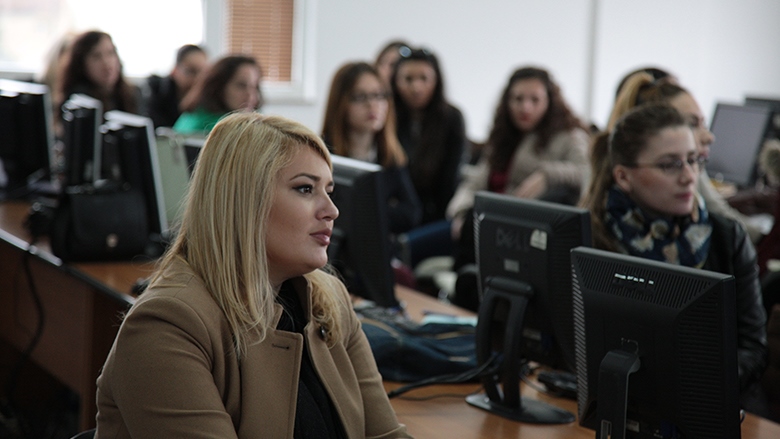Erlisa Zherka is a 22-year-old finance math student from Kosovo. She recently landed a full-time online contract with a US-based car brokerage startup through the Women in Online Work (WoW) program, a pilot that aims at rapidly training up to 100 beneficiaries on technical (IT) and soft skills, which are in demand by the ever-growing online freelancing market.
The pilot graduate, Erlisa, who received her online work training in the municipality of Lipjan, is already making more than country’s wage average (€300-400, per Kosovo 2015 Labor Market Survey). Her duties include testing proprietary software and customer relations. She works in tandem with another online freelancer – a young male from Serbia. If asked before her enrolment in the pilot, Erlisa would not have believed this type of opportunity would be possible. “Everyone was surprised to learn this exists”, she explained when describing the reaction of her family and friends.
Erlisa’s peer Dafina Kajtazi is similarly benefitting from online freelancing in Gjakova, the other Kosovo municipality where the WoW pilot took place. Since July, Dafina, a psychology program graduate, has been working part-time as Virtual assistant for a Dutch firm, while supplementing this hourly income with writing and research fixed-type online contracts for firms and individuals based in Greece, India, Malta, and the USA.
Like Erlisa, Dafina pushed herself to bid for jobs within the first month of her training. The efforts paid off quickly: “I’ve learned from every contract I gained, from every client, even from those when I haven’t got a job. I learned many things because I researched the job, applied and had an interview. I have also learned the basics of coding and about soft skills.”
New job opportunities, higher earnings
Erlisa and Dafina are members of the graduating cohort of the first phase of the World Bank’s WoW pilot, funded by the Korea Green Growth Trust Fund and implemented by Danish firm CodersTrust. The success of this employability- and skills-enhancing training program was to be measured against an ambitious target of at least 66 pilot graduates earning at least one hundred Euro through online work, gained competitively, in the three-month period following the completion of training. Now, it can be said with certainty that this target is within reach.
The first phase, lasting 6 months, recently drew to a close, with some noteworthy results. Having received a tailored training and targeted on-the-job guidance, 56 women have obtained at least one online work contract, collectively landing almost 180 fixed and hourly jobs. Although the pilot was intended to focus primarily on training, and successful job bidding was not expected to happen until the final days of the program, the first contract was actually signed only three weeks after WoW started – a nice and welcome surprise for all stakeholders involved in the project.
The amount of collective earnings on these contracts has totaled approximately US$13,000. With their average wage of over US$5 per hour, WoW online workers are already making twice as much per hour than the average person in Kosovo (based on the 35 hour work week and the average monthly salary of EUR400, or around US$450, as reported in the Kosovo 2015 Labor Market Survey). They compete globally for jobs in data entry, web development, research and writing, and translation.


